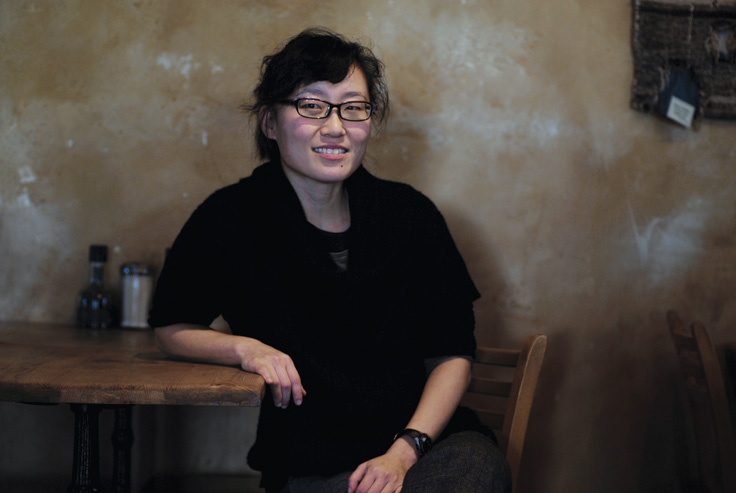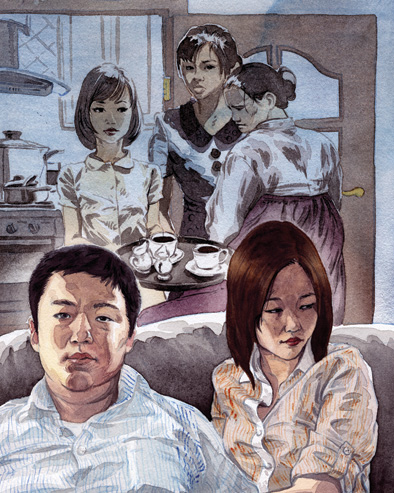In Juli Kang’s musical, two artists find love by belting it out
By Kai Ma
Photograph by Eric Sueyoshi
It’s an undeniable fact. Koreans love to sing.
Which is why the best karaoke bars are nestled in Koreatown. Why Korean Christians can spend hours, if not days, praising the Lord. And why, among various social circles in South Korea, singing is simply the only way to introduce oneself.
Filmmaker Juli Kang is familiar with the Korean predisposition to belting it out. “I moved to Korea during college,” she says, “and every group I met was like, ‘Introduce yourself through a song!’ And I was in this group in L.A. that would just get together to sing. And at church, too, we’d sing. Singing is just a part of who I am, and a part of Korean culture.”
Kang is the director of Damn the Past!, a campy 29-minute musical about self-acceptance and the pursuit of happiness.
“The message is that you don’t have to be like everybody else to have good things happen, or to be able to fall in love,” says Kang, 37. “I wanted people to feel hopeful. To know that they’re perfect just the way they are.”
[ad#336]
The Korean characters, played by a pan-Asian cast, include Mario Lee (Jun Hee Lee), a pseudo-mute grease monkey who can only express himself through song, and Gloria Kim (Annie Katsura Rollins), who as a dancer on the brink of insanity, is the literal, contemporary version of a “maniac on the floor.” Gloria’s mother, a character inspired by the melodramatic, fainting matriarchs of Korean soap operas, is somewhat of a villain, pressuring her daughter to forgo shaking her booty and tie the knot instead.
Sure, they sound like a bunch of kooks, but both Mario and Gloria epitomize more than the creative and socially stigmatized. They represent anyone who wishes to pursue one’s dreams, despite the obstacles. Despite being different.
In short, Mario and Gloria represent us.
And indeed, they — along with every other character — illustrate various parts of the director’s psyche.
“Language barriers and immigrant life have much to do with not being able to express ourselves,” says Kang, who emigrated from South Korea with her family in 1974. “I was so shy because my first language was Korean. But, it’s difficult for anybody to be expressive, or to be brave enough to do so. That’s universal. I relate to each character — even the mom because I get crazy, too!”
[ad#336]
But the mute songbird Mario was really inspired by Kang’s father, a man who could only fully express himself through song. “He’s shy,” says Kang. “Being an immigrant makes it harder to come out of your shell.” With friends, Kang’s parents would croon Korean folk songs on a family karaoke set — even crying mid-verse because they missed the home they left.
“It moved me because usually, my dad was not talkative,” recalls Kang. “But in song, he was able to express the depth of his emotion.”
Kang’s parents — whose first date in Korea was watching The Sound of Music — always had the voices of Julie Andrews and Gene Kelly blasting on the tube. “Musicals were on all the time,” says Kang, who now lives in West Hollywood. “The entire family was into it.”
Schooled at Wesleyan and UCLA, Kang, whose favorite musical is Les Parapluies de Cherbourg (The Umbrellas of Cherbourg), a 1964 French film directed by Jacques Demy, also works at the Sundance Institute. She’s produced a documentary about youth in Philadelphia, and is the director of narrative films, Princess Fever and The Liberation of Everyday Life. Completed in 2007, Damn the Past! has been screened at several festivals and received the UCLA Directors Spotlight and Student Awards for Excellence in Visual Design and Originality.
With a composer, Kang drew from the catchy tunes of Pavement, the Kinks and Outkast to produce the songs. It was a good opportunity for Kang to flex her melodic muscles. Since 16, she’s played guitar and written her own songs. The former deejay also jams with her brother in an indie rock band, but uses the word “band” loosely. “I’ve played out three times in my entire life,” she says. “But it’s always super-fun.”
[ad#336]
The cast of 20 singer-dancer actors was filmed in several pockets of Los Angeles, including Altadena, the location of Mario’s employer, the Miracle Auto Repair Shop. When the real owner of the shop informed Kang that he charged $10,000 for the space to be shot, she told him that the scene involved dancing girls.
“And he was like, ‘Dancing girls? Are they cute? OK!’ So, he gave us a huge discount,” Kang says.
Drawing from her own life, the film confronts several aspects of the immigrant and Korean American experience. First off, there’s the intense pressure to wed: “It’s so emphasized in our culture that once you hit a certain age, you have to be married.” Then, there’s the expectation to land the Ivy League: “Korean parents are obsessed with their kids being Harvard graduates and rich doctors. Guilt holds us back when we can’t deliver what they want.” And interestingly enough, by creating a ‘50s-inspired American backdrop — with an Asian version of Danny Zuko, to boot — Kang pays homage to her South Korean roots: “In the ‘50s, Korea started modernizing and it was also a time of war. My parents were young, and started thinking about coming to America. It was an idealistic time … when everything was possible.”
Embracing possibilities is a mantra that the musical pounds over the head. Which the director admits isn’t always the easiest thing to do. “I was a history major,” she says. “I’m definitely the type of person who dwells on the past. So, this is a message to myself too: Get over it, move on and be hopeful about the future.”
Rich with color, choreography and two young artists who zoom through town on a scooter, Kang’s jazzy musical tackles the quest for love: love for oneself, love for family and, yes, love for the crazy, hot heroine who does a mean pirouette. And during these recessionary times, don’t we all need to take flight from reality — through a 29-minute love song, at least?
“Musicals offer a good way to escape,” Kang says. “They’re so emotional, colorful, fantastical. It’s like a dreamworld, and that’s why I make movies anyway: to make my dreams come true.”









